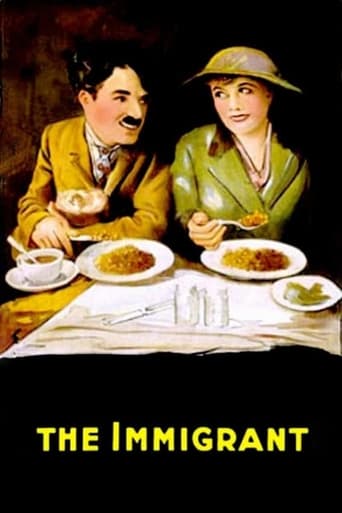John Brooks
1917. Wow. That's a long time ago ! Can't believe it's more than a century old, now.If you're familiar with Chaplin films, then this can be summarized by saying it's got all the typical charm and ridiculous comedic gymnastics and twists he and only he could bring to the big screen: that ability to keep a plot relevant and alive while focusing on filling up vacant scenes with hilarity and potent entertainment; producing something out of nothing put bluntly; while instilling a very subtle sense of humanity and genuine goodness all at the same time. The entire restaurant scene is exactly that: there's basically nothing going on, or little, and yet it's a scene that is undoubtedly memorable."The tramp" persona was well established at the start already it seems, as Chaplin's classic leitmotiv is the crux of the story here: a man miserable financially but with seemingly bottomless affection and enormous emotional wealth. 7.5./10.
binapiraeus
During the two years Charlie Chaplin worked for Mutual Films, he certainly developed his own UNIQUE style that made him the most popular comedian in the world to perfection; and, along with "Easy Street", "The Immigrant" is probably his greatest work from that period (which he himself described as the happiest time in his life).Of course, there's plenty of the good old slapstick comedy that had made him famous in his Keystone days, and there are just SO many unforgettably funny scenes in this 25-minute masterpiece - the way he wins his 'starting capital' for his new life in the New World in a card game, the way he 'shares' his soup with one of his fellow passengers on the rocking ship, his first lunch in an American restaurant and his struggle for the money to pay his bill, with the threat of being beaten up by the big, mean waiter (Eric Campbell, in the role of the bullying baddie once again)...BUT there's also that most DISTINCTIVE note of social criticism which coined Chaplin's later works, EVERY single one of which was to become a timeless classic of inestimable cultural worth, and marked the 'birth' of a new movie genre: the tragicomedy. First, we get to see the conditions under which poor people from all nations travel to the United States, hoping for a better future there - while as soon as our little tramp sets foot on American soil, things are a LOT different than he expected: he doesn't even know how to pay for his food, neither for that of the lovely girl he'd met on board the ship (Edna Purviance, of course, cute as a button in one of her most wonderful roles), and whose sick mother has died in the meantime... So, will there be a typical 'Hollywood happy ending' for our young couple after all? In less than half an hour, this PERFECTLY played, directed and timed film (after the shooting was finished, Chaplin sat at the editing table for FOUR whole days and nights, 'trimming' it to exactly the MASTERPIECE it finally became) tells us a great human story, makes us simply LOVE the protagonists and hope and worry for their fate, become a bit thoughtful about social conditions - and, of course, at the same time makes us roar with laughter! Well, THAT is Charlie's very own and inimitable recipe...
Robert J. Maxwell
Chaplin had just gained release from Essanay and had control over this production. It resulted in one of his most subtle and funny short films, with much less of the pointless slapstick of his earlier, less shaped work. There are really one two scenes. Chaplin's tramp is on a ship bringing immigrants to America and meets Edna Purviance, his real-life main squeeze. Next, Chaplin, with no money to speak of, finds himself in a restaurant facing the mean, monumentally gigantic form of waiter Eric Campbell.Well, Chaplin does a marvelous job with difficult material. I mean, the material must be difficult when the humor (and sentiment) has to depend on action without any dialog -- and without simple-minded pratfalls.There is a sequence involving a coin that's been dropped on the floor that's as carefully choreographed as any dance involving Gene Kelly and Debby Reynolds in "Singin' In The Rain." So many people claim that Charlie Chaplin was a genius that I can almost believe it. But I wouldn't go that far. I'd just say he's very talented.
ackstasis
'The Immigrant (1917)' shows Chaplin really finding his feet as a performer and a storyteller. In this 20-minute comedy, the Little Tramp arrives in New York City following a tumultuous transatlantic journey, throughout which the vessel pitched like an amusement park ride. The ever-resourceful Tramp is first seen sprawled over the side of the ship, as though indulging his sea-sickness, but then emerges to reveal himself with a flailing fish in hand. There's also a very touching scene, foreshadowing an unforgettable moment in 'City Lights (1931),' in which Chaplin surrenders his money to a pretty girl (Edna Purviance) in the most humble way he can manage – only to get accused of pickpocketing!Following his arrival in America, the broke and lonely Tramp finds some money on the sidewalk and buys a meal, only to realise – too late – that he's lost the coin. Desperate to avoid being beaten up by the burly waiter and kitchen staff, he tries to obscure the fact that his finances are inadequate. Chaplin's timing, as ever, is exquisitely funny, and even then he had mastered the combination of comedy and sentiment that would make him one of Hollywood's most powerful and respected artists. Edna Purviance is delicate and sympathetic as a fellow immigrant, and the massive Eric Campbell is amusingly intimidating as a café head- waiter who's willing to flay a man for being ten cents short of the bill.


